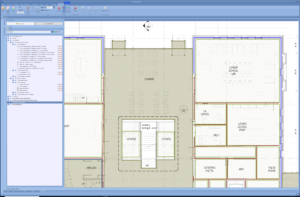Smart Cities and How They're Shaking Up Construction
When you walk into your house after a long day of work, do you pull out a key, or do you just open up your phone and navigate to an app that connects to a “smart lock”? As you settle down to watch TV, do you have to remember to switch off the lights, or do you simply say, “Alexa, turn off the living room lights?” If you said yes to the latter, then you’re already familiar with the concept of smart homes.
But did you know that this same idea is now also being applied to entire cities? As technology has continued to advance at a rapid pace, the movement toward cities to become more self-sufficient with a combination of both information and communication technologies has started increasing in popularity. Industry magazine ConstrucTech observes that the market for smart cities will grow from $308 billion in 2018 to $717.2 billion by the year 2023. This trend is already impacting the construction industry and accelerating changes.
What Are Smart Cities?
 Smart cities rely on an infrastructure that allows buildings, cars, and traffic lights to communicate with one another.
Smart cities rely on an infrastructure that allows buildings, cars, and traffic lights to communicate with one another.
While the phrase “smart cities” may sound a little intimidating, the idea is pretty simple: a community that utilizes an infrastructure to gather data from various day-to-day activities—garbage pickups, traffic lights, parking meters—and then uses a combination of artificial intelligence and data analysis to streamline these activities as much as possible.
For example, in the case of traffic lights, connected lights can receive data from sensors as well as car headlights and the time of day to adjust to traffic in real-time, which helps significantly cut back on road congestion. Likewise, smart cities also have the capacity to communicate with connected cars and direct them to available parking spaces in their area.
These small changes seem incredibly simple at first glance, but for dense cities projected to only grow bigger in future years, a smart infrastructure can have a host of benefits. Some of these include improving the quality of life for residents, reducing financial and material waste, and making better use of existing resources.
How Do Smart Cities Impact Construction?
The emergence of smart cities is a net positive for the construction industry, generally speaking; smart cities require updated infrastructures that allow for network communication, and someone has to build those infrastructures. However, because smart cities require a different approach than traditionally developed cities, construction will also have to adjust accordingly.
Interestingly, the two biggest qualities that successful smart city projects need from contractors are qualities already being advanced by preconstruction:
- Data collection and analysis
- Collaboration among multiple departments in different sectors
Data Collection and Analysis
The key to smart cities isn’t just extremely fancy, cutting-edge technology: it’s really about generating hundreds of data points, analyzing that data to improve decision-making, and then communicating that information to connected devices (like the aforementioned traffic lights) so that they can adjust accordingly and continue to make their workflow as efficient as possible, data point by data point.
This focus on data and communication means that general contractors will need to start becoming multi-faceted, able to show that they are experts in computer analytics in addition to construction. Real estate publication The American Genius points out that Toyota’s Woven City project is an excellent example of the marriage between construction and computer science: architects work alongside computer scientists and researchers at the Woven City project.
 Autonomous cars are a significant aspect of smart cities.
Autonomous cars are a significant aspect of smart cities.
In this test pilot of a fully-fledged smart city, architects have the ability to experiment and tinker with different designs, specifically to determine the most ideal ways for people and the environment they live and work in to interact with autonomous cars. These architects will work in tandem with computer scientists who will help them understand the data that they are generating in order to make adjustments as needed and try other approaches.
Collaboration Among Multiple Spheres
The development of smart cities requires general contractors to be attuned not just to analytics and computer science, but also to the needs of residents, who will likely come to have more influence in the infrastructure process via community forums or town halls. In other words, smart cities necessitate serious collaboration from everyone involved.
Some contractors are already taking proactive steps toward cross-sector collaboration. PCL Construction partnered with building data and energy analytics software company CopperTree Analytics in order to bring energy management, monitoring-based commissioning technology, and data analytics to both retrofitted buildings and new construction in North America.
While you may not have worked on any smart city projects yet, you can still get ready by encouraging collaboration within your own companies. That might look like adopting tools—especially estimating software—that allows you all to speak the same language and access the same data, or it might look like diving deeper into data visualization to improve communication with project owners.
Disadvantages of Smart Cities
Although smart cities definitely bring a lot of exciting possibilities to the table, and will likely become an amazing revenue source for many contractors, there are still some drawbacks to be aware of as we move forward.
One of the greatest potential threats is that of cybercrime. Currently, it's relatively difficult for an individual or even a group of hackers to take down an entire city's power grid. But moving to an interconnected infrastructure opens up cities to increased vulnerability to hackers. Additionally, concerns about privacy and consolidated mass information are often raised in discussions about smart cities.














